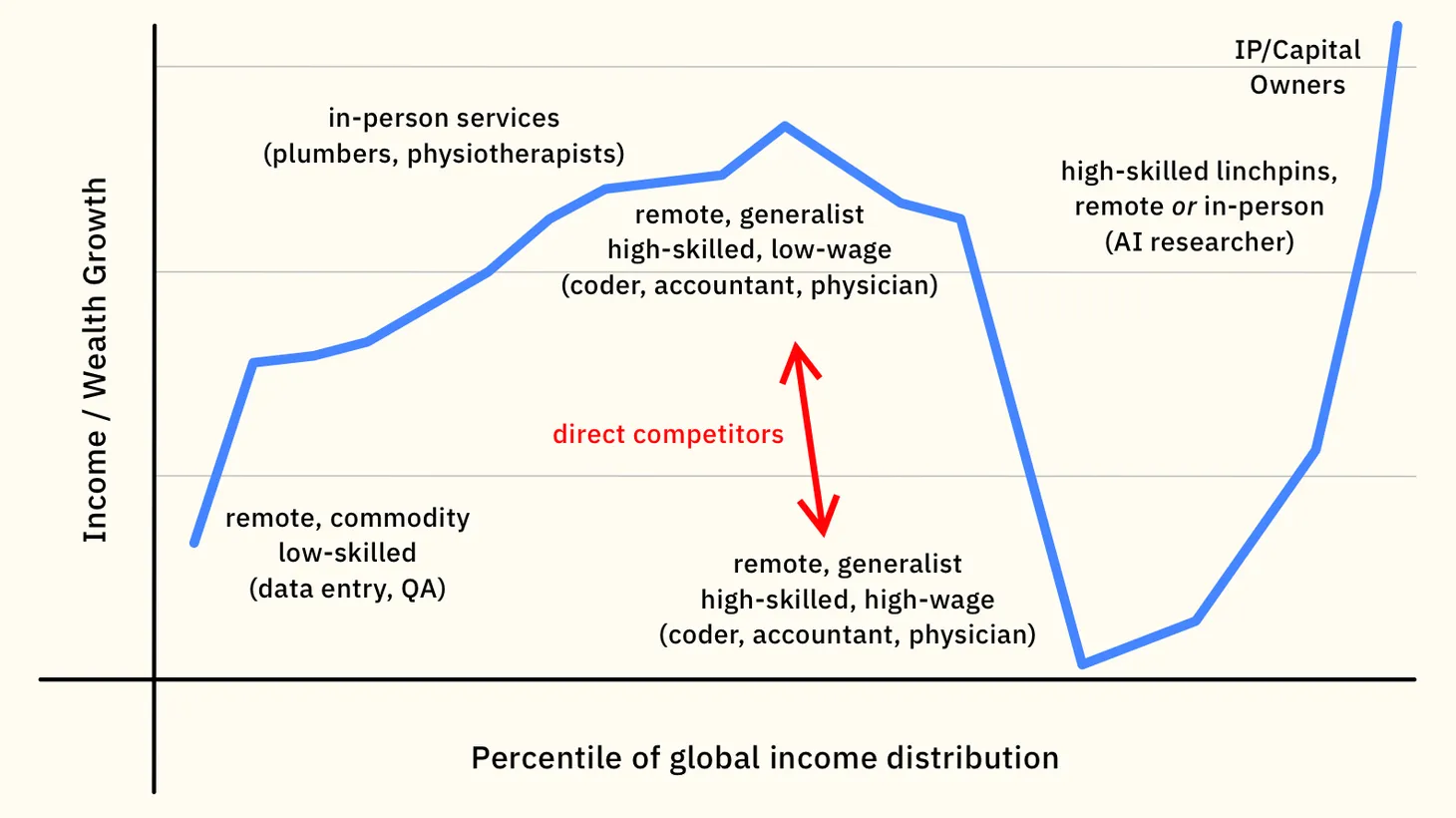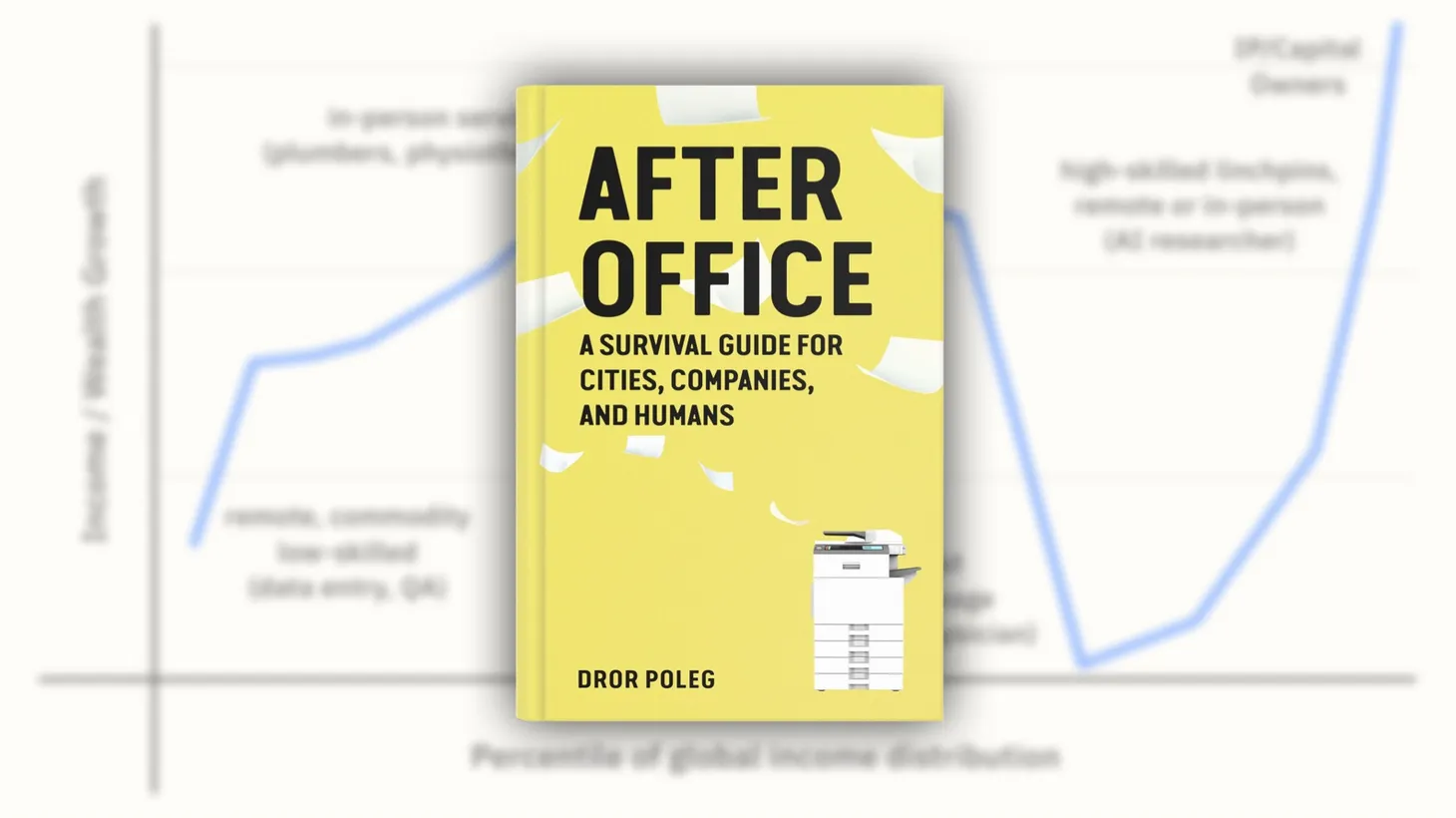After Office: What's Next?

I spent the past few weeks going through the draft of After Office as well as about 150 other short pieces I've written about related topics. I now have a clearer idea of where the book is headed and my work plan for the rest of the coming months.
I intend to complete the book by the end of this year, hoping to publish the digital and possibly the audio version before December 31st. I'll give the print version a bit more time since it's harder to correct.
As part of the updated plan, the newsletter and podcast will also change — for the better! Below is an update of what I have in mind.
Book Structure
The book will be divided into two main parts. The first half will describe "the world we take for granted" or "how we got to here." It will trace the evolution of work and offices over the past 200 years and its interaction with economic, political, and social factors. The purpose is not to write a history of offices but to tease out parallels and concepts that can guide our thinking about the future and ground the book's second half.
Most of this half has already been written as part of the official book (and the premium newsletters you've received). However, it will require editing and reorganizing to fit its purpose.
The second half of the book will focus on the future. It will be divided into five main parts:
- Welcome to the Non-Linear Economy: Exploring the deep currents that will make work more distributed. Beyond the preferences of individual employees or specific cohorts (Millennials, Gen Zers), the economy no longer requires the type of workplaces and corporate structures that prevailed during the 20th century. We're headed to a world where work is more specialized and creative, and outcomes are more uncertain and unequal. The whole process of production will be different, including the boundaries between production and consumption, work and leisure. I have written a lot about aspects of the non-linear economy in disparate newsletter posts. The goal is to combine all these posts and ideas into a coherent thesis about the future.
Once the general outlook is clear, I will explore the consequences for cities, companies, and careers, using the office as a point of departure. I see three paths ahead for offices: Repurpose, Reshuffle, and Reimagine. - Repurpose: This section will explore what happens to offices that are no longer needed. What can they become, what are the implications and strategies that cities can and should employ, what is the impact (and opportunity) for the environment, and more.
- Reshuffle: This section will explore the redistribution of people and economic activity across space. It will consider the impact of remote and distributed work, the potential impact of AI on overall employment, and the type of jobs humans perform, and consider not-yet-mature technologies such as autonomous and flying vehicles. This section will also consider the challenges and opportunities for people and places in developing and developed countries.
- Reimagine: This section will start by considering what needs to happen to the offices that remain and those that are yet to be built. It will consider their purpose, design, and place in people's lives. It will then proceed to explore the broader role of work and workplaces in people's lives, and some potential alternatives that will emerge as offices recede from the center of our civilization.
- Synthesis and Action Plan: The final section of the book will draw all the insights together and tease out practical strategies for cities, companies, and individual people who want to make the most of the dramatic change in how, where, and why we work.
Publishing Process
I will no longer publish sequential pages of the book on a weekly basis. Instead, I will post different ideas and insights every week and tie them together in the editing process once I feel everything's ready.
To make it more valuable and fun, the newsletter will adopt a different format inspired by Ben Evans. Each week, the newsletter will include some quick takes on relevant news, links, short thoughts on books or articles I'm reading, and a longer analysis piece (which will ultimately be part of the book).
The first newsletter in this format will come out this weekend — possibly as soon as tomorrow.
In addition, I am starting a series of podcast interviews with thinkers and doers. The focus will be on the future of work and cities, but it may occasionally cover other topics I'm interested in, such as geopolitics, peacemaking, and education. Below is a list of people I want to have on the podcast. This is a wish list, not a confirmed guest list. Please let me know if there's anyone else I should speak to — particularly people in parts of the world or society that aren't represented well in the list below.
That's it for now. I'm excited about where the book and newsletter are going. So much has changed since I set off to write After Office at the beginning of this year!
Thank you again for reading, and do share any thoughts and suggestions.
Best,

Podcast Wishlist
Below is an initial wishlist of podcast guests. I asked my intern (ChatGPT) to add a short description and relevant link for each. It did a decent job, but I still had to correct many details. The links are provided for your benefit — these are all interesting people with ideas or ventures that matter.
The list includes some of my readers, so feel free to reach out if you see your name! I'll follow up with you in any case.
- Matthew Kahn: Expert in remote work and climate adaptation, author of "Going Remote" and "Adapting to Climate Change." @mattkahn1966
- Bill Bishop: Known for "The Big Sort," analyzes American social and political divisions. TheBigSort.com
- Tracy Hadden Loh: Researcher at Brookings Institution, focuses on urban policy and economics. @LohPlaces
- Robert Fishman: Author of "Bourgeois Utopias," explores the history and impact of suburban life. Robert Fishman @ UMich
- Robert Putnam: Known for "Bowling Alone," delves into social capital and community decline. robertdputnam.com
- Joel Garreau: Author of "Edge City," explores the evolution and future of urban landscapes. garreau.com
- Branko Milanovic: Economist, specializes in income inequality and global economics. @BrankoMilan
- Richard Baldwin: Author of "The Globotics Upheaval," examines technology's impact on globalization and robotics. @BaldwinRE
- Bruce Katz: Urban policy expert, known for practical solutions to local governance challenges. @bruce_katz
- Luis Bettencourt: Author of "Introduction to Urban Science," focuses on the scientific modeling of cities. @BettencourtLuis
- Adam Ozimek: Economist, focuses on labor markets, migration, and urban economics. @ModeledBehavior
- Richard Florida: Urban theorist, famous for the "Creative Class" concept, examines city development. @Richard_Florida
- Enrico Moretti: Labor economist, interested in the geography of work and innovation. @EnricoMoretti
- Derek Thompson: Writer and commentator on economics and culture, explores their intersection. Twitter: @DKThomp
- Jorge Almazan: Author of "Emerging Tokyo," examines Tokyo's evolving urban landscape. @J_Almazan_Arch
- Joel Kotkin: Critic of contemporary urbanism, focuses on suburban vs. urban development. Website: joelkotkin.com
- Cindy McLaughlin: Expert in zoning and NYC policy, explores its impact on urban growth. @cindymclaughlin
- Jim Russell: Geographer, tracing the reshuffling of economic activity and housing. @ProducerCities
- Scott Rechler: Chairman and CEO at RXR, specializes in developing and converting office spaces to adapt to new economic conditions. @ScottRechler
- Itamar Rabinovich: Middle East expert, focuses on geopolitics and diplomatic relations, particularly the Peace Process. Twitter: @ItamarRabinovic
- Matt Clancy: Economist and researcher, explores what drives innovation. Twitter: @mkclancy
- Adam Neumann: Co-founder of WeWork, speaks on the future of work and communal living.
- Liran Rozenfeld: Founder of Yoko Village, advocates for intentional communities as a new way of living.
- Saskia Sassen: Sociologist, focuses on globalization and international cities, offers a non-U.S. perspective. Twitter: @SaskiaSassen
- Nicholas Bloom: Economics professor, studies remote work, work-life balance, and management practices. Twitter: @StanfordNBloom
- Alain Bertaud: Urbanist with international experience, discusses market-driven approaches to urban planning. AlainBertaud.com
- Svenja Gudell: Chief Economist at Indeed Hiring Lab, serves on the Board of Directors for the National Association for Business Economics. Twitter: @SvenjaGudell
- Albert-László Barabási: Author of "Linked," explores network theory and its implications for cities and work. Twitter: @barabasi
- Jed Kolko: Former Chief Economist at Indeed, now Under Secretary of Commerce for Economic Affairs at the US Government, focuses on labor and economic trends. Twitter: @JedKolko
- Chris Green: Founder and CEO at GreenPoint Partners, invests in technology and real assets to reduce emissions and improve adaptation. GreenPointPartners.com
- Ben Wilson: Author of "Metropolis," delves into the history of cities and how they've shaped civilization and culture. @Metropolis_Ben
- Sonia Hirt: Author of "Zoned in the USA," explores the unique zoning laws in the United States and their impact on urban development. @SoniaHirt
- Edward Glaeser: Economist, author of "Triumph of the City," focuses on the economics of cities and explores how urban environments affect people and economies. Ed Glaeser @ NBER
- Diana Lind: Author of "Brave New Home," explored shared housing and urban renewal strategies. DianaLind.com
Dror Poleg Newsletter
Join the newsletter to receive the latest updates in your inbox.




